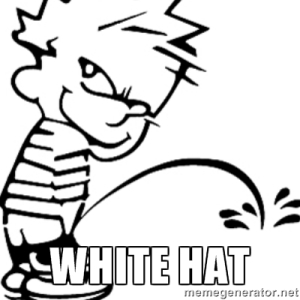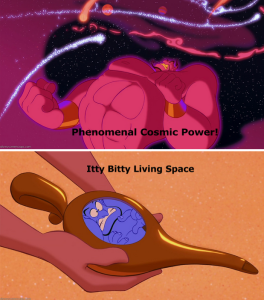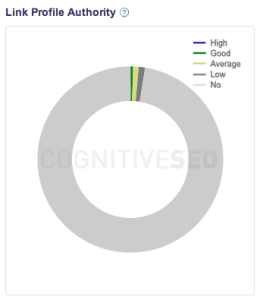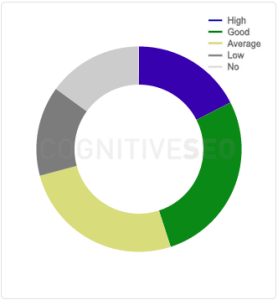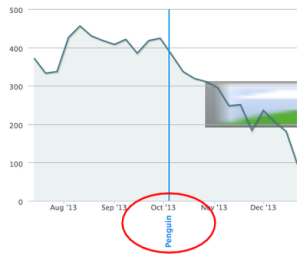What is a delinkuent? Well, according to a legit Wikipedia page that I didn’t just build, a delinkuent is a website that is building links every way Google expressly forbids, and is getting away with it. I’m not talking about the occasional paid link- I’m talking about a backlink portfolio that comes home the next morning with someone else’s lipstick on its collar; the cheating is that obvious.
I hate to oversimplify it, but here’s how the Internet works: Search engines like Google use complex algorithms to decide who will rank and, by extension, who will not. While Google claims to have over 200 different ranking factors in their algorithm, one factor we know all search engines use is hyperlinks. Links between web sites always have been, and always will be, an essential part of these algorithms. Once upon a time Google couldn’t really tell natural links from unnatural links, but those days are long gone. Google’s “Penguin” algorithm update evaluates sites with low quality or spammy links, and de-indexes or un-ranks the living heck out of them. There MAY be like one or two (hundred) other things I left out, but that’s basically how it works.
While pitching in on NiftyLaw’s recent study into top ranking attorneys, I spotted a couple of these bad boys; I couldn’t help but dig a little deeper into why they’re so bad and how they’re pulling it off. I want to discuss a few of my findings here. It is important to remember these guys are the exception, not the rule. Thanks to algorithmic updates, remaining on that first page without following Google’s rules is becoming increasingly rare. However, just like real-life delinquents, these attorneys can either grow up and ‘disavow’ their bad habits, or suffer the penalties; the future well-being of their site depends on that choice.
The Unrepentant Sinner
During our study I found a certain Florida attorney ranking #1 both in the organic and local pack for his search term. This guy was exactly where he wanted to be. Was it his sterling link building practices? Unequivocally no. The site had 6,087 links from just 87 domains. I think the genie from Aladdin described this situation best. Over 6,000 links represents the possibility of phenomenal cosmic power. Pair that with just 87 domains, and you’re cramming that power into an itty-bitty living space.
I’ve always heard links described as ‘votes’ between sites, like an election. So, if one candidate gets 6,000 votes from 6,000 voters, and another candidate gets 6,000 votes from just 87 voters, whom will the police arrest for voter fraud? And if we can make that deduction about this site’s links with a single glance, Google’s Penguin algorithm will tear this site apart… eventually. He’s still ranking #1 organically, over 3 months after the study has concluded. He’s nowhere to be found in the local pack though, which could be a sign that the authorities are on to him.
The Redemption Seeker
Let’s look at another delinkuent, this time in Washington. At the time of our study, this attorney had a staggering 120,500 links coming from just under 200 domains. Again, it’s possible that some of these links are legitimate, right? According to my Cognitive SEO report on link quality, there’s a tiny, TINY slice on a pie chart that demonstrated their good link authority. The other 99.2% looked terrible.
Have his spammy links affected his ranking? I checked back in on this top ranking hoodlum recently, and found that he had dropped in organic rankings – from #1 to #5. Big deal, he’s still on the first page. However, there’s a very good reason why he only lost 4 positions. Where before I had found over 120,000 links, now I’m only showing about a thousand. Based on his updated link profile, we can make another deduction. Just after our study concluded, this attorney had disavowed all but .8% of his total links. Now take a look at his link profile authority.
If you think sorting through your links, identifying the bad guys, and generating and uploading a disavow file sounds like a lot of work, you’re right. It can be tedious, and if you’re ranking well in spite of some shady linking history, it can be hard to motivate yourself to make that change. This next sentence is so important I’m going to make it bright orange. It’s much easier to prevent a penalty than it is to recover from one. Now, our Washington attorney has a healthy mix of authoritative links and the added benefit of maintaining his first-page position throughout the process. This delinkuent was proactive; he turned his situation around. If sites like this shape up before penalties fall, they stand a chance of not only surviving, but maintaining long term rankings.
Can You Hear That Sobbing?
So, we have an unrepentant, un-penalized delinkuent, and a repentant, un-penalized former delinkuent. I know what you’re thinking- “where are the penalties? I want to see some punishment!” As long as it’s not your site, right? Don’t worry, our study is replete with examples of Google dishing out punishment, but their stories are pretty short.
For example, here’s the sob story of a mid-west personal injury attorney I checked back in on. At the time of our study, he held a first-page rank. Now, Moz’s ‘Rank Tracker’ tells me he’s “Not in top 50.” I didn’t bother looking farther down the list for him, and neither will his potential clients. That’s why getting penalized means you can kiss your site traffic goodbye.
As for the delinkuents still slipping through the cracks, there’s more bad news coming their way. That last guy most likely suffered a manual penalty rather than a true penguin penalty. That’s because Penguin hasn’t been officially updated since October 2013. The next Penguin update has been a long time coming, and it’s due to be released any time. As you can see from my screenshot, getting hit by penguin will wreck your traffic flow just as much as a manual penalty.
The Golden Rule of Penalties
If I had to come up with one thought you should take away from this post it would be the following: Learn from someone else’s mistakes. If you have any doubt about your link practices in the past (whether you did them or hired a company) you need to review your link profile and prepare a disavow file before you get hit with a penalty. Here’s a link to help you get started: http://moz.com/blog/link-audit-guide-for-effective-link-removals-risk-mitigation.
If you happen to be counting on plausible deniability, I have some sad news for you. Google doesn’t care where the links came from. The tactic of “My old SEO Company did those, I had no idea what they were doing” won’t hold up in a reinclusion request and even less if you get hit by penguin. Your only tactic is to try and clean up your profile now before you get hit. As the great American Benjamin Franklin once (almost) said, “An ounce of Penguin prevention is worth a pound of penalty recovery.” Words to live by.
